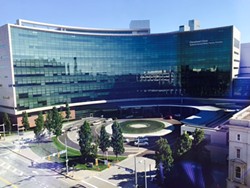The Cleveland Clinic is announcing a new Center for Men’s Health, which will focus on urologic conditions like pelvic pain, erectile dysfunction, and enlarged prostate. One of the center’s first priorities will be to send staff to the Clinic’s LGBT facility located in the Lakewood Family Health Center to provide specialized care for gay, bisexual, and transgender men.
The center is located at the Clinic’s main campus in the Glickman Urological & Kidney Institute. It’s headed up by Dr. Daniel Shoskes, who said he was chosen for his broad experience in urologic men’s health.
Shoskes says that new data indicate men in the LGBT community have specific sexual issues when it comes to urologic care. The questionnaires given to male patients at clinics, for example, have often been heterosexually-focused with questions like, “Are you able to penetrate the vagina?”
“They’re uncomfortable in the standard urologic office setting, even about bringing up their sexuality and how it’s going to be addressed,” Shoskes says. “We wanted to partner with our LGBT clinic to see what we could do better for the urologic side of their care.”
The LGBT clinic already provides services like testosterone replacement therapy for transgender people. The new center will provide care for transgender men, including treatment of urologic issues related to past surgeries.
Shoskes says the reason most men don’t seek care for sexual issues is often just plain embarrassment.
“In general, men are much less likely to seek medical care when they develop new problems,” he says. “These aren’t the kinds of things men talk about with their friends: troubles with urination, erections and sex drive. There’s often a great deal of embarrassment either in mentioning it to family members or calling up a doctor for an appointment.”
When it comes to gay, bi and trans men, Shoskes says they hope having Clinic staff see patients at the LGBT center will help ease embarrassment.
While most men eventually experience issues like pelvic pain and erectile dysfunction, the way conditions like prostate cancer are treated can vary between heterosexual and gay men.
“With prostate cancer, treatment priorities and side effects are different,” Shoskes says, citing emerging data.
Heterosexual men, for example, tend to be less concerned about loss of ejaculatory function after surgery for prostate cancer than gay or bi men. “So treatments other than standard surgery that could preserve that would be more appropriate,” Shoskes says.
According to Shoskes, devoting an entire center to urologic issues helps doctors learn about and care for other conditions like heart disease and diabetes.
“By having a multidisciplinary approach the hope is to better identify the other diagnoses that are going on and provide integrated care,” he says.
The center hopes to learn from its patients, too.
“We’re trying to present sexual and urologic care in a way that will be welcoming to members of the community, acknowledging that we understand their sexual issues and are trying to learn where the deficiencies have been,” Shoskes says.
According to a statement, the center will also make the Clinic “the only hospital in the area” to offer low-intensity shock wave therapy for erectile dysfunction and chronic pelvic pain. The treatment was first developed for kidney stones.


